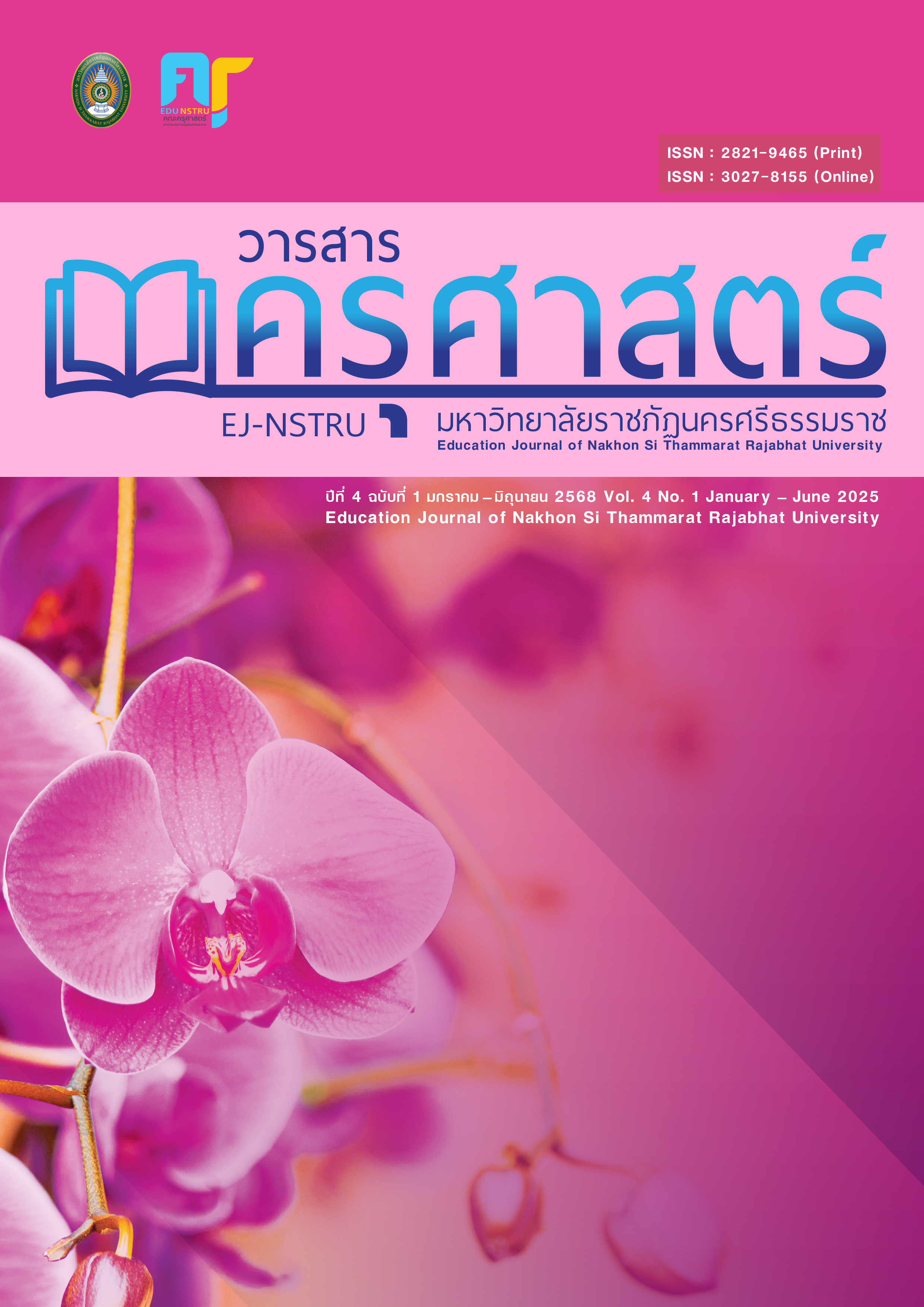การเรียนรู้แบบการตั้งคำถามแบบโสเครติสเพื่อส่งเสริมความเป็นพลเมืองตื่นรู้ฐานเศรษฐศาสตร์ยั่งยืน
Main Article Content
บทคัดย่อ
พลเมืองตื่นรู้ฐานเศรษฐศาสตร์อย่างยั่งยืน คือ บุคคลที่สามารถปฏิบัติตามหน้าที่ของตนได้อย่างครบถ้วนมีความรับผิดชอบต่อผลกระทบจากการกระทำของตนเองที่เกี่ยวข้องกับสิ่งแวดล้อม โดยใช้สิทธิ์ของตนในการเลือกทางที่เกิดประโยชน์ต่อสาธารณชน ทั้งด้านการศึกษาเกี่ยวกับธรรมชาติและสิ่งแวดล้อม รวมถึงการวิจารณ์ เพื่อปกป้องทรัพยากรธรรมชาติ ซึ่งมีผลกระทบต่อการดำรงชีวิตที่ต้องพึ่งพิงทรัพยากรธรรมชาติ นอกจากนี้ พลเมืองกลุ่มนี้ยังใช้หลักเศรษฐศาสตร์เป็นเครื่องมือสำคัญในการอธิบายปรากฏการณ์ทางสังคมที่เกิดขึ้น เพื่อตามหาทางออกที่สอดคล้องกับบริบททางสังคม กระบวนการเรียนรู้เพื่อส่งเสริมความเป็นพลเมืองตื่นรู้ฐานเศรษฐศาสตร์ยั่งยืนนั้น ประกอบด้วย 1) การสร้างความสนใจในประเด็นต่าง ๆ 2) การสร้างความเข้าใจร่วมกัน3) การวิเคราะห์และประเมินผล และ 4) การสังเคราะห์และประเมินผลลัพธ์ กระบวนการเรียนรู้เหล่านี้ถูกออกแบบให้เชื่อมโยงกับการตั้งคำถามแบบโสเครติสในทุกขั้นตอน ซึ่งการตั้งคำถามแบบโสเครติสช่วยสร้างพลเมืองสิ่งแวดล้อมโดยการกระตุ้นให้ผู้เรียนพัฒนาความตระหนักรู้ด้านจริยธรรม ความสามารถในการคิดวิเคราะห์ การตัดสินใจ และการสนทนาอย่างสร้างสรรค์ ซึ่งเป็นคุณสมบัติที่สำคัญสำหรับการเผชิญกับปัญหาสิ่งแวดล้อมในปัจจุบัน เพื่อกระตุ้นให้ผู้เรียนคิดเชิงวิพากษ์ สำรวจความเข้าใจของตนเอง และตั้งคำถามต่อประเด็นที่ซับซ้อน อีกทั้งยังส่งเสริมการสนทนาอย่างเปิดเผยและลึกซึ้ง เพื่อให้เกิดการวิเคราะห์เชิงลึกเกี่ยวกับการตัดสินใจทางเศรษฐกิจและผลกระทบต่อสิ่งแวดล้อม ผู้เรียนจะได้รับโอกาสในการพัฒนามุมมองที่หลากหลายและค้นหาวิธีแก้ไขปัญหาอย่างยั่งยืน
Article Details

อนุญาตภายใต้เงื่อนไข Creative Commons Attribution-NonCommercial-NoDerivatives 4.0 International License.
บทความที่ได้รับการตีพิมพ์เป็นลิขสิทธิ์ของวารสารครุศาตร์ มหาวิทยาลัยราชภัฏนครศรีธรรมราช
ข้อความที่ปรากฏในบทความแต่ละเรื่องในวารสารวิชาการเล่มนี้เป็นความคิดเห็นส่วนตัวของผู้เขียนแต่ละท่านไม่เกี่ยวข้องกับวารสารครุศาสตร์ มหาวิทยาลัยราชภัฏนครศรีธรรมราช
เอกสารอ้างอิง
Abdullah, N. Niazi, J., Idris, G., & Norul Hidayah, B.M. (2022). Socratic Questioning: A Philosophical Approach in Developing Critical Thinking Skills. Al Hikmah International Journal of Islamic Studies and Human Sciences, 5(4), 143-161. https://doi.org/10.46722/hikmah.v5i4g
ALU Site Admin. (2020, February 10). Understanding the Socratic Method of Teaching. Abraham Lincoln University. https://www.alu.edu/alublog/understanding-the-socratic-method-of-teaching/
Barry, J. (2005). Resistance is fertile: From environmental to sustainability citizenship. ResearchGate. https://www.researchgate.net/publication/253186425_Resistance_Is_Fertile_From_Environmental_to_Sustainability_Citizenship
Zach, C. (2014, April 29). The Fragility of the Socratic Method. Medium. https://medium.com/@zachcaceres/the-fragility-of-the-socratic-method-3d57d0a19a0a
Charoenmuang, T. (2017). Citizens and Democratic Society. Kobfai Publishing Project. (in Thai)
Chetpayark, K. (2017, May 17). “Democracy classroom is not only about civic duties” Talk with Asst. Prof. Atthaphon Anantaworasakul. The Matter. https://thematter.co/social/active-citizen/24144 (in Thai)
Dobson, A. (2007). Environmental citizenship: Towards sustainable development. Sustainable Development, 15(5), 276–285. https://doi.org/10.1002/sd.344
European Cooperation in Science and Technology. (2022, June 5). What does it mean to be an environmental citizen?. COST. https://www.cost.eu/environmental-citizenship/
Facione, P. A. (2015). Critical Thinking: What It Is and Why It Counts. Insight Assessment.
Hadjichambis, A., C. & Hadjichambi, D., P. (2020). Education for Environmental Citizenship: The Pedagogical Approach. In Mueller, M., P. & Tippins, D., J. (Eds), Conceptualizing Environmental Citizenship for 21st Century Education. (pp.237-261). Springer Open.
Horne, R., Fien, J., Beza, B. B., & Nelson, A. (2016). Sustainability citizenship in cities: Theory andpractice. Routledge.
Jaffe, L. (2023, December 4). Advantages and Disadvantages of the Socratic Method of Teaching. Higher Learning Hub. https://higherlearninghub.com/advantages-and-disadvantages-of-the-socratic-method-of-teaching/
Littig, B. (2004). The Neo-Socratic Dialogue (NSD): a method of teaching the ethics of sustainable development. In Galea, C. (Ed.), Teaching business sustainability : vol. 1, from theory to practice. (pp. 240-252). Sheffield: Greenleaf Publ. https://nbn-resolving.org/urn:nbn:de:0168-ssoar-5415
Machin, A., & Tan, E. (2024). Green European citizenship? Rights, duties, virtues, practices and the European green deal. European Politics and Society, 25(1), 152–167. https://doi.org/10.1080/23745118.2022.2118984
Mangkhang, C. (2022). Intelligence in Teaching Social Studies. Lanna Printing. (in Thai)
National Strategy 2018-2037. (2018, October 13). Royal Gazette, Volume 135, Section 82. Pages 1-71. https://www.ratchakitcha.soc.go.th/DATA/PDF/2561/A/082/T_0001.PDF (in Thai)
Paul, R., & Elder, L. (2007). Critical Thinking: The Art of Socratic Questioning. Foundation for Critical Thinking. https://www.criticalthinking.org/files/SocraticQuestioning2006.pdf
Pedaste, M., Maeots, M., Siiman, L. A., De Jong, T., Van Riesen, S. A. N., Kamp, E. T., Manoli, C. C., Zacharia, Z. C., & Tsourlidaki, E. (2015). Phases of inquiry-based learning: Definitions and the inquiry cycle. Educational Research Review, 14, 47-61. https://doi.org/10.1016/j.edurev.2015.02.003
Sangwanglao, J. (2020). The application of economic literacy in the economics curriculum of Thai basic education. Journal of Education Naresuan University, 22(3), 324-336. Retrieved from https://so06.tci-thaijo.org/index.php/edujournal_nu/article/view/178450 (in Thai)
Sayer, A. (2010). Method in social science: A realist approach (2nd ed.). Routledge.
Seub Nakhasathien Foundation. (2024). Situation of forests and the environment in Thailand 2023. https://shorturl.asia/Xlo4m (in Thai)
Siripongnapat, V. (2023). The Enhancement of Active Citizenship for Learners through Socratic Questioning. Journal of Education Studies, 51(1), 1-13. https://doi.org/10.58837/CHULA.EDUCU.51.1.8 (in Thai)
Smith, G. (2005). Green citizenship and the social economy. Environmental Politics, 14(2), 273-289. https://doi.org/10.1080/09644010500055175
Sutton, J. (2020, Jun 19). Socratic Questioning in Psychology: Examples and Techniques. Positive Psychology. https://positivepsychology.com/socratic-questioning/
The 13th National Economic and Social Development Plan (2023-2027). (2022, November 1). Royal Gazette. Volume 139, Special Section 258. Pages 1-149. https://www.nesdc.go.th/ewt_news.php?nid=13651 (in Thai)
University of Mary Washington. (n.d.). Economic sustainability. https://sustainability.umw.edu/areas-of-sustainability/economic-sustainability/
Vygotsky, L. S. (1978). Mind in Society: The Development of Higher Psychological Processes. Harvard University Press.
Wang, Y. Y. (1996). Sustainable Economic Development. In Guitián, M. and Mundell, R.A. (Eds.), Inflation and Growth in China. (pp.123-133). International Monetary Fund.
Westheimer, J., & Kahne, J. (2004). What kind of citizen? The politics of educating for democracy. American Educational Research Journal, 41(2), 237–269. https://doi.org/10.3102/00028312041002237


